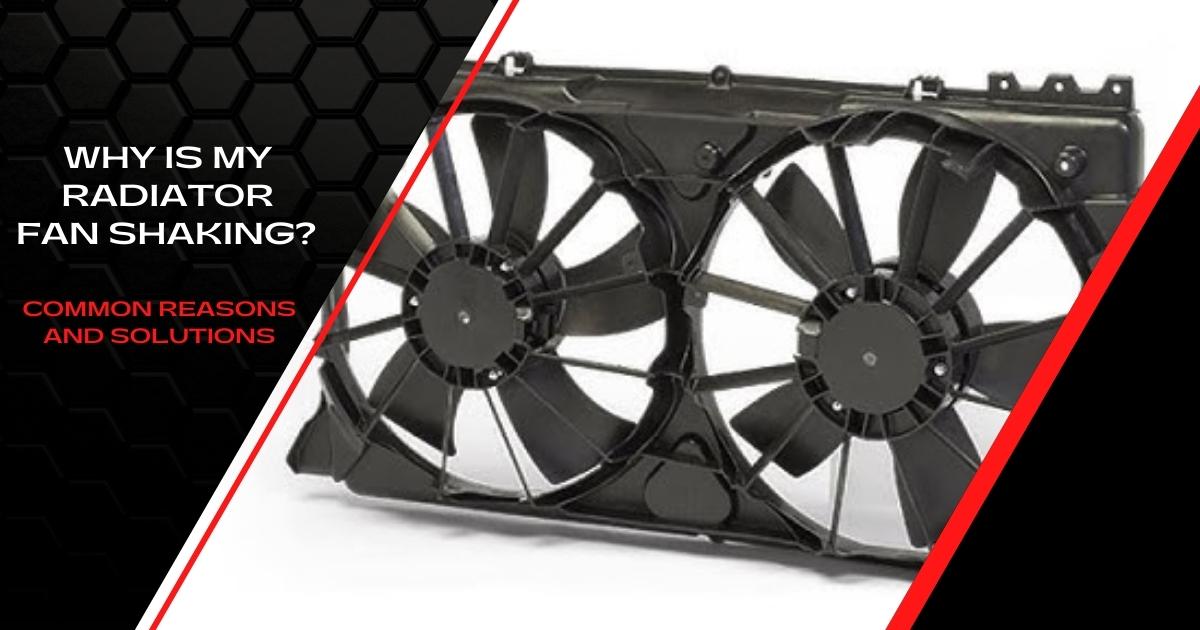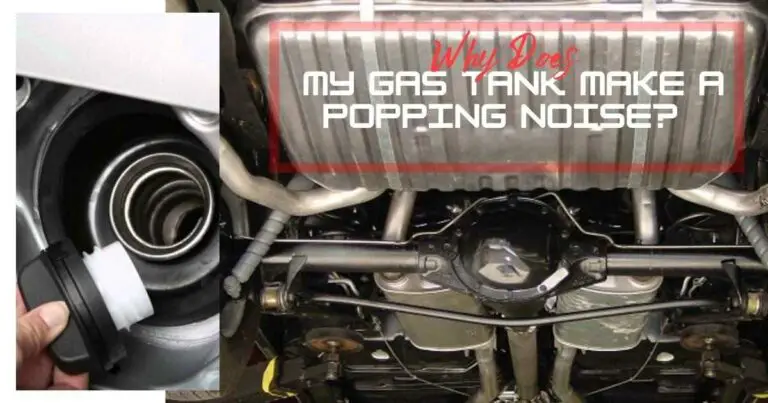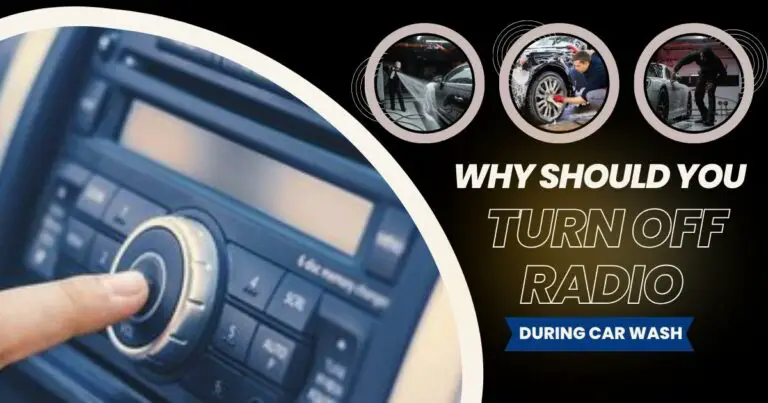Why is My Radiator Fan Shaking? Common Reasons and Solutions
The car’s radiator fan serves the vital function of cooling the engine by directing airflow through the radiator. The fan doesn’t operate continuously but rather activates when necessary to regulate the coolant’s temperature.
The radiator fan’s operation is governed by either a thermostatic switch or the vehicle’s engine computer, depending on the specific car model. Additionally, it can be triggered by other factors like the activation of the air conditioning system or when the transmission fluid temperature rises beyond a certain threshold.
A well-functioning radiator fan is designed to perform its cooling function reliably, but it can still experience issues or malfunctions over time. If you’ve noticed that your radiator fan is shaking or exhibiting unusual vibrations, it can be a cause for concern.
In this article, we’ll discuss some of the reasons why a radiator fan might shake and share ideas on how to fix it.

Why is My Radiator Fan Shaking?
If your radiator is damaged or starts shaking more frequently, it’s a sign that something isn’t quite right. Any irregularities in its performance can lead to overheating, reduced engine efficiency, and irreversible damage. Some of the reasons that can make a radiator fan wobble or shake include;
Mounting Issues
Mounting issues are a common cause of radiator fan shaking, and they stem from the way the radiator is securely affixed within the vehicle. When the mounting brackets or bolts that hold the radiator in place become loose or damaged, it can lead to radiator fan wobbling problems.
If the radiator is not anchored firmly, it is bound to vibrate and shake during vehicle operation. These vibrations may not only affect the radiator fan but also the entire cooling system. As a result, the radiator may not dissipate heat effectively leading to inefficient cooling.
Additionally, loose or damaged mounts can result in the misalignment of the radiator. This misalignment can hinder the proper functioning of the radiator and may even cause it to make contact with the fan, leading to shaking.
Coolant Flow Problems
Coolant flow problems within the radiator can also contribute to radiator fan shaking. Over time, debris, sediment, or deposits can accumulate inside the radiator, blocking or restricting the flow of coolant through its internal passages. This can, in turn, disrupt the smooth and even flow of coolant, thereby causing turbulence within the radiator.
As coolant encounters blockages or restrictions, it is likely to create turbulent flow patterns within the radiator. Consequently, this can hinder the radiator’s ability to effectively regulate the engine’s temperature, leading to uneven cooling and, in some cases, resulting in vibrations and shaking of the radiator fan.
Physical Damage
Physical damage is a common cause of radiator fan shaking, and it can result from various factors, including road debris or accident impacts. Radiator fans have thin metal fins that help dissipate heat. These fins are susceptible to bending if they come into contact with debris or other objects on the road. The bent fins can, in turn, disrupt the smooth airflow through the radiator, which can affect its cooling efficiency and potentially lead to shaking.
The radiator also contains tubes through which coolant flows. When these tubes become damaged or punctured, they tend to leak coolant. This reduces the radiator’s ability to regulate engine temperature which can contribute to the shaking of the fan. This not only affects the radiator’s ability to dissipate heat effectively but also impacts the fans integrity. As a result, the fans may experience vibrations and shaking during operation.
Corrosion
Corrosion is a gradual but persistent issue that can affect radiator fans over time, especially in regions with harsh weather conditions. This natural process occurs when the radiator’s metal components are exposed to moisture and air, leading to the formation of rust and corrosion.
As corrosion progresses, it can eat away at the metal components of the radiator, including the fans, tubes, and even the core. This weakening can make the radiator more susceptible to vibrations and shaking during normal operation.
Corrosion can also affect the internal passages of the radiator, reducing its effectiveness in facilitating the transfer of heat from the engine coolant to the surrounding air. The compromised cooling efficiency can lead to increased engine temperatures, which may further contribute to radiator fan shaking.
Coolant Leaks
Coolant leaks are a concerning issue that can have a cascading effect on the performance of a radiator fan and the entire engine cooling system. Generally, leaks can occur if the radiator is damaged or due to deteriorating seals and connections within the cooling system.
When a radiator develops a leak, it results in a gradual loss of coolant fluid. As the coolant level drops, there may not be enough liquid to efficiently absorb and dissipate heat from the engine. With reduced coolant levels, the radiator’s ability to regulate engine temperature becomes compromised.
As a result, the engine may start running hotter than normal, which can generate vibration in the process. These vibrations can, in turn, be transferred to the radiator fan, leading to shaking and overall instability.
Engine Vibrations
Excessive engine vibrations can also contribute to radiator fan shaking, although this is relatively less common compared to other causes. These vibrations can result from various issues within the engine or the vehicle’s overall structure, and they can affect the radiator’s stability.
Engines naturally produce vibrations as they operate. These vibrations are typically dampened by engine mounts and other components designed to absorb and minimize them. However, if these mounts or components deteriorate or become damaged, they can lead to excessive engine vibrations being transmitted to the radiator.
When the radiator absorbs these vibrations, it can make the fan start to shake. This shaking may not be limited to the fan alone but can also affect other components connected to the cooling system.
Fan-Related Problems
Over time, the blades of the radiator fan can become unbalanced due to wear, damage, or debris accumulation. When the fan spins with unbalanced blades, it generates uneven airflow, resulting in usual vibrations.
Additionally, if the fan motor malfunctions, it may not spin at the correct speed or may become erratic in its operation. This can lead to inconsistent airflow, causing the radiator fan to shake as it tries to cope with the irregular cooling.
How to Fix Loose Radiator Fan
- Visual inspection- Begin by visually inspecting the radiator fan and its mounting components. Look for any obvious signs of damage, loose bolts, or brackets. A thorough visual inspection will often reveal obvious issues that may be contributing to a loose fan. If you identify any visible damage, loose components, or signs of wear, you can then proceed to address these issues one after the other.
- Check the fasteners- Tighten any loose bolts, brackets, or mounting hardware that secure the fan to the radiator or shroud. Apply consistent pressure when tightening each fastener. Avoid over-tightening to avoid damaging threads or components. Instead, aim for a snug fit.
- After tightening the fasteners, gently try to move the fan blades by hand. There should be no excessive play or wobbling. If you notice any movement, recheck and retighten the fasteners as needed.
- Fan blades- When examining the fan blades, check for damage or warping as these issues can contribute to vibrations. If you find damaged blades, replace them to ensure the fan operates without causing vibrations. Ensure to inspect fan blades regularly as part of routine maintenance to help prevent future problems.
- Examine engine mounts- As we mentioned earlier, loose or damaged engine mounts can play a significant role in transmitting excess vibrations to the radiator and fan, thereby causing shaking. Monitor the engine mounts for any excessive movement or play. If they move significantly or appear damaged, it’s an indication that they may need replacement.
- Check for coolant leaks- Checking for coolant leaks is crucial to maintaining the proper functioning of the radiator and preventing associated problems. As such, make sure you repair or replace damaged seals or hoses to help stop the leaks and restore the coolant system’s efficiency. Furthermore, regular inspections and timely maintenance can catch coolant leaks early, preventing them from causing more significant issues.
- Check the condition of electrical connections- Carefully examine the wiring, connectors, and relays associated with the radiator fan. Look for any visible signs of damage, fraying, or loose connections.
- Inspect connectors and terminals for signs of corrosion or oxidation, which can hinder electrical conductivity. Ensure to clean or replace any corroded components as needed. In addition, ensure that all electrical connections, including plugs and terminals, are properly seated and securely connected.
- Replace the coolant temperature sensor- The coolant temperature sensor plays a vital role in determining when the radiator fan should activate. A faulty sensor can cause the fan to shake or turn on at the wrong temperature or not turn on at all.
- Observe whether the radiator fan operates when the engine reaches its normal operating temperature. If the fan shakes or does not engage when it should, it might indicate a malfunctioning coolant temperature sensor.
- Check the fan alignment- Confirm that the fan is correctly positioned within the fan shroud and in alignment with the radiator. If you notice any misalignment, carefully adjust the fan’s position within the shroud and realign the mounting brackets as needed. In addition, make sure the fan blades are parallel to the radiator’s surface.
Also Read: How to Clean Lexus NuLuxe Seats in Simple Steps
Conclusion
Addressing a shaking radiator fan promptly not only ensures the reliability and efficiency of the radiator but also extends the life of your cooling system, which contributes to safer and more eco-friendly driving. A well-functioning radiator fan ensures that your engine remains cool, efficient, and environmentally responsible, allowing you to enjoy worry-free driving for miles to come. Remember, regular inspections, timely repairs, and necessary maintenance are your allies in preventing overheating, vibrations, and other complications that could affect your vehicle’s performance and longevity.






